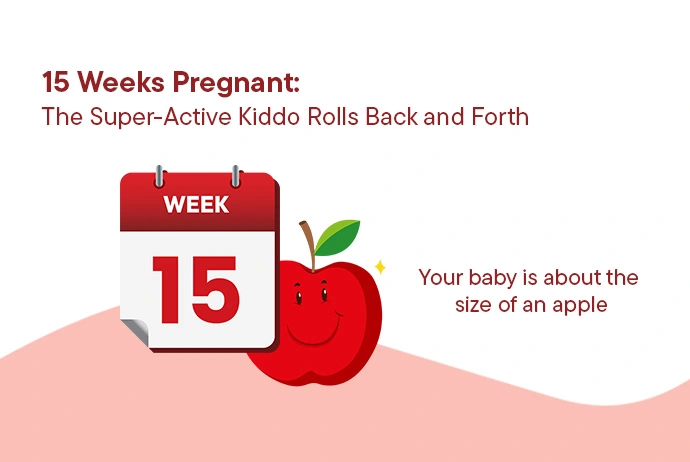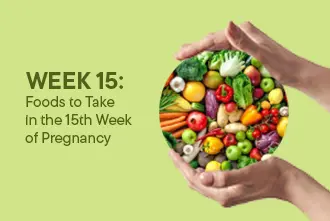
Dr. Aruna Ashok MBBS, MS OG, DNB OG
- Clinical Director

Welcome to week 15 of your pregnancy! This is a delightful time. Because your baby is becoming more active. You might not feel those tiny movements yet, but rest assured, your little one is busy inside. At this stage, your baby is about the size of an apple, weighing around 70 grams. The bones are starting to harden, and muscles are developing, which means your baby can move more purposefully. You might catch glimpses of these movements during an ultrasound, and it's truly a magical experience.
As an Obstetrician and Gynaecologist with a decade of experience, I can tell you that these movements are a sign of a healthy and developing baby. Your baby is practicing movements like kicking, rolling, and even hiccupping. These actions are crucial for strengthening muscles and developing motor skills.
Imagine your baby floating in a cozy, warm fluid, stretching and flexing tiny limbs. This movement is not just adorable but essential for development. It helps the baby’s joints and bones form correctly. During this time, it's important for you to stay active as well. Gentle exercises like walking or prenatal yoga can help you stay fit and also encourage your baby to move.
Have you wondered what your baby is doing when you’re not feeling those kicks? Even though you might not sense it yet, your baby is quite the acrobat. Rolling back and forth, somersaulting, and maybe even practicing a few future dance moves. It's all part of the process that prepares your baby for life outside the womb.
As you progress through your pregnancy, attending birthing classes can be incredibly beneficial. At A4 Fertility Centre, our birthing classes offer comprehensive guidance on what to expect, how to stay healthy, and how to connect with your baby. These classes can help you understand the importance of fetal movements and what they indicate about your baby’s health.
Remember, each baby is unique, and the timing of when you start feeling these movements can vary. Some mothers feel them as early as 16 weeks, while others may have to wait a bit longer. If you have any concerns, always feel free to discuss them with your healthcare provider. We are here to stand by you every step of the way.
Are you excited to feel those first fluttering kicks? It’s one of the most memorable milestones in your pregnancy journey!


Entering the 15th week of pregnancy brings a mix of relief and new symptoms. The early nausea might be subsiding, but new changes are on the horizon. Your body is adjusting to support your growing baby, and this week, you might notice several symptoms.
One of the most common symptoms is an increase in energy levels. Many women find that the fatigue of the first trimester lifts, and they feel more vibrant and energetic. This newfound energy can be a great time to get things done, but remember to pace yourself and not overdo it.
Another noticeable change is in your skin. The increased blood flow and hormones can give you that "pregnancy glow" you’ve heard about. Your skin might look more radiant and slightly flushed. However, some women may also experience skin issues like acne or darkening of the skin around the nipples, known as the areolas. These changes are temporary and typically resolve after pregnancy.
Your growing belly is more noticeable now. You might start to show a small bump, which can be both exciting and a bit overwhelming. Along with this, you might experience round ligament pain. This is a sharp pain or jabbing feeling often felt in the lower belly or groin area. It's caused by the stretching of ligaments that support your growing uterus. Gentle stretching and changing positions slowly can help ease this discomfort.
Have you noticed an increase in your appetite? It’s common to feel hungrier as your baby grows. Just remember to opt for healthy, nutritious snacks. Eating small, frequent meals can help manage hunger and keep your energy levels stable.
Your emotional state is also important. It’s normal to have mood swings or feel anxious about the changes happening in your body and life. Talking to your partner, friends, or joining a support group can be very helpful. Emotional well-being and physical health are important.
To support you through these changes, A4 Fertility Centre offers counseling services. Our experts provide personalized advice and support, helping you navigate the emotional ups and downs of pregnancy. Attending these sessions can help you feel more prepared and less anxious.
How are you feeling about these changes? Remember, every symptom is a sign that your body is doing an amazing job supporting your baby.
Your diet plays a crucial role in supporting your baby’s growth and your well-being during pregnancy. In the 15th week, focusing on nutrient-rich foods is more important than ever. Let’s explore some dietary choices that can benefit you and your baby.
First, ensure you’re getting enough protein. Protein is important for the growth and fixing of tissues. Good sources include lean meats, poultry, fish, beans, lentils, and dairy products. Keep in check 75-100 grams of protein daily. This can help support your baby’s developing tissues and muscles.
Plenty of fruits and vegetables into your meals should be added. Vitamins, minerals, and fiber are rich in fruits and vegetables. Fiber is particularly important as it can help prevent constipation, a common issue during pregnancy. Leafy greens like spinach and kale, and colorful veggies like carrots and bell peppers, are great choices.
Calcium is significant for your baby’s growing bones and teeth. Dairy products like Cheese, yogurt, and milk are good sources. If you’re lactose intolerant or prefer non-dairy options, consider fortified plant-based milks and juices. You should include 1000 milligrams of calcium per day.
Iron is another critical nutrient. It supports the increase in blood volume during pregnancy and helps prevent anemia. Include iron-rich foods like red meat, poultry, fish, beans, and fortified cereals. Pair these with vitamin C-rich foods like oranges, strawberries, and tomatoes to enhance iron absorption.
Hydration is also key. Drinking plenty of water helps maintain amniotic fluid levels and supports increased blood volume. Aim for at least 8-10 glasses of water daily. Herbal teas and fresh fruit juices can also be good options, but avoid excessive caffeine and sugary drinks.
Don’t forget healthy fats. Omega-3 fatty acids are essential for your baby’s brain and eye development. Include sources like fatty fish (such as salmon and sardines), walnuts, chia seeds, and flaxseeds in your diet.
Finally, prenatal vitamins can help fill any nutritional gaps. These are specially formulated to provide the essential nutrients needed during pregnancy. Always consult your healthcare provider before starting any new supplement.
At A4 Fertility Centre, our nutritionists can guide you on creating a balanced diet plan tailored to your needs. We also offer cooking classes and tips on preparing nutritious meals that are easy and delicious.
How are you finding your current diet? Making small, healthy changes can have a big impact on your pregnancy journey.
Counseling during pregnancy can be a valuable resource, helping you navigate the physical, emotional, and psychological changes you’re experiencing. At 15 weeks, counseling can offer support and guidance as you prepare for the months ahead.
Pregnancy is a time of significant change, and it’s normal to feel a range of emotions. You might feel excited, anxious, happy, or overwhelmed—all in the same day. Counseling provides a safe space to explore these feelings and develop coping strategies.
One of the main benefits of counseling is stress management. Pregnancy can bring about concerns regarding your health, the baby's well-being, and future parenting responsibilities. A counselor can help you manage stress through relaxation techniques, mindfulness, and positive thinking.
Emotional support is another key aspect. You might find it helpful to talk about your experiences and feelings with someone who understands and can provide professional guidance. Counseling sessions can cover topics like body image, relationship dynamics, and preparing for childbirth.
Counseling also helps in building a support network. Your counselor can connect you with support groups where you can share experiences with other pregnant women. This community support can be incredibly reassuring and empowering.
At A4 Fertility Centre, our counseling services are designed to support you through every stage of pregnancy. Our experienced counselors provide personalized sessions that focus on your unique needs. Whether it’s addressing anxiety, preparing for birth, or simply having someone to talk to, we are here for you.
Prenatal counseling can also include discussions about birth plans. What are your preferences for labor and delivery? Are you considering natural birth, epidural, or other pain management options? Talking through these choices with a counselor can help you feel more informed and confident.
Additionally, counseling can support your partner. Pregnancy affects both of you, and having a space to discuss concerns and expectations can strengthen your relationship. Partners can join sessions to better understand how to support each other during this time.
Have you thought about how counseling might help you? Taking care of your mental health is just as important as your physical health during pregnancy.
In the 15th week of pregnancy, certain tests and screenings are recommended to ensure both your health and your baby’s development. These tests can provide valuable information and help manage any potential risks.
One of the common tests during this time is the second-trimester maternal serum screening. This blood test measures specific substances produced by the baby and the placenta. It helps assess the risk of chromosomal conditions like Down syndrome and neural tube defects. While it’s not a definitive diagnosis, it can indicate if further testing is needed.
Another important screening is the ultrasound scan. Around this time, a detailed ultrasound, often called the mid-trimester or anomaly scan, is performed. This scan examines your baby’s anatomy, checking for any physical abnormalities. It’s also a chance to see your baby’s movements and growth more clearly. The ultrasound can provide a lot of reassurance about your baby’s development.
If you have a higher risk for genetic conditions or if the initial screenings indicate potential issues, your healthcare provider might recommend more specific diagnostic tests. One such test is amniocentesis. This procedure involves taking a small sample of amniotic fluid from around the baby to test for genetic conditions. While it carries a small risk, it can provide a definitive diagnosis for certain conditions.
Additionally, some routine tests are important for monitoring your overall health. These include blood pressure checks, urine tests for protein and glucose levels, and regular weight monitoring. High blood pressure and high glucose levels can indicate conditions like preeclampsia or gestational diabetes, which need careful management.
Your healthcare provider might also suggest checking your iron levels. Anemia is common during pregnancy, and ensuring you have adequate iron is crucial for preventing fatigue and supporting your baby’s growth. If your iron levels are low, your doctor might recommend dietary changes or iron supplements.
It's also essential to stay updated on any vaccinations recommended during pregnancy. Vaccines like the flu shot and the Tdap vaccine (which protects against whooping cough) are important for protecting both you and your baby from infections.
At A4 Fertility Centre, our comprehensive care includes guiding you through these tests and screenings. Our experts ensure you understand each test’s purpose, benefits, and any risks involved. We also offer support in interpreting the results and planning any necessary follow-ups.
Are you feeling overwhelmed by the number of tests? Remember, these screenings and tests are in place to ensure the best possible outcome for you and your baby. Always feel free to ask your healthcare provider any questions you have about these procedures.
By focusing on these aspects, you can make informed choices and feel more confident during your pregnancy. At A4 Fertility Centre, our birthing classes are designed to support you through every stage, providing you with the knowledge and tools you need for a healthy and happy pregnancy journey. Do you feel ready to take the next step in your pregnancy care? Our team is here to help you every step of the way.